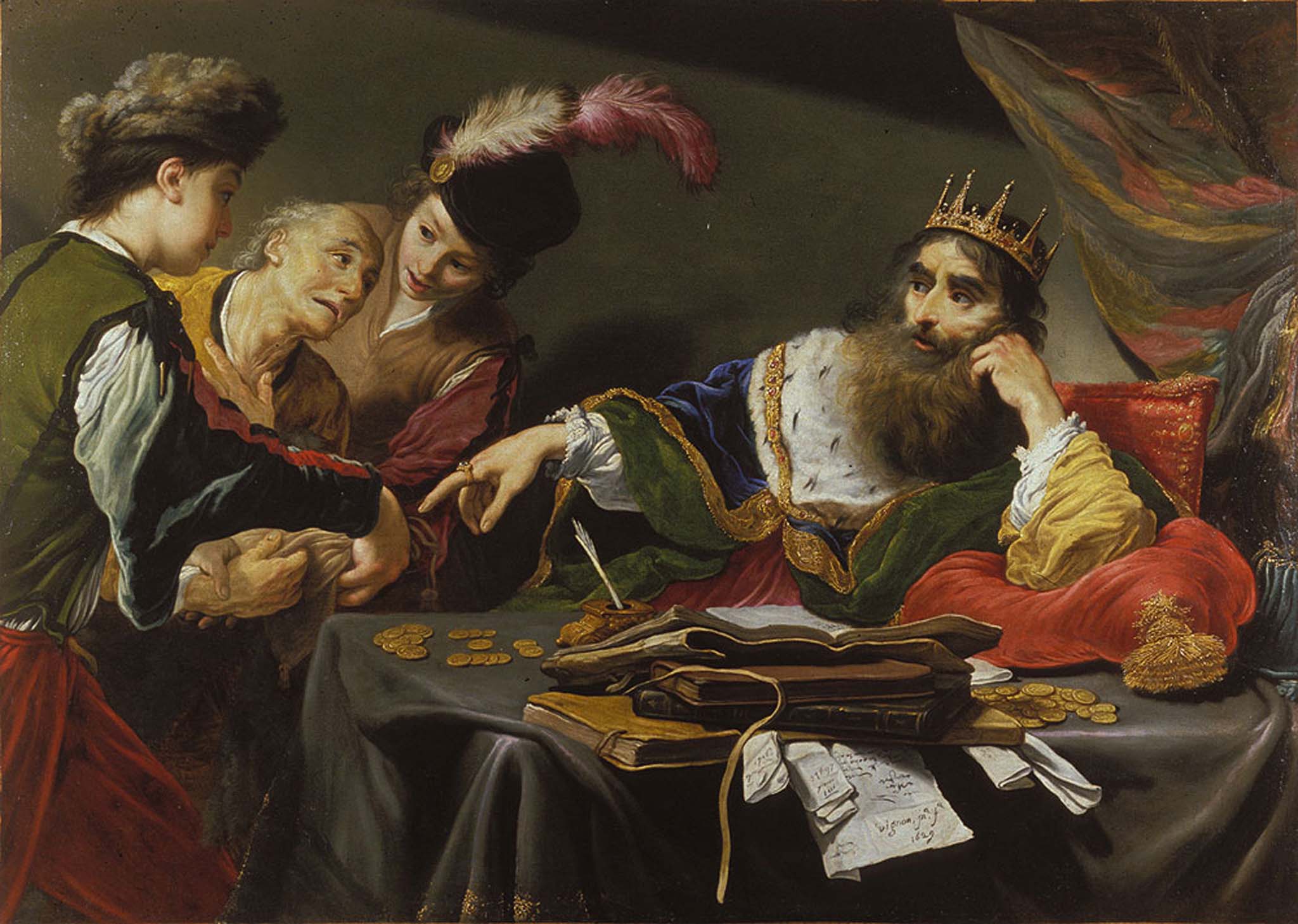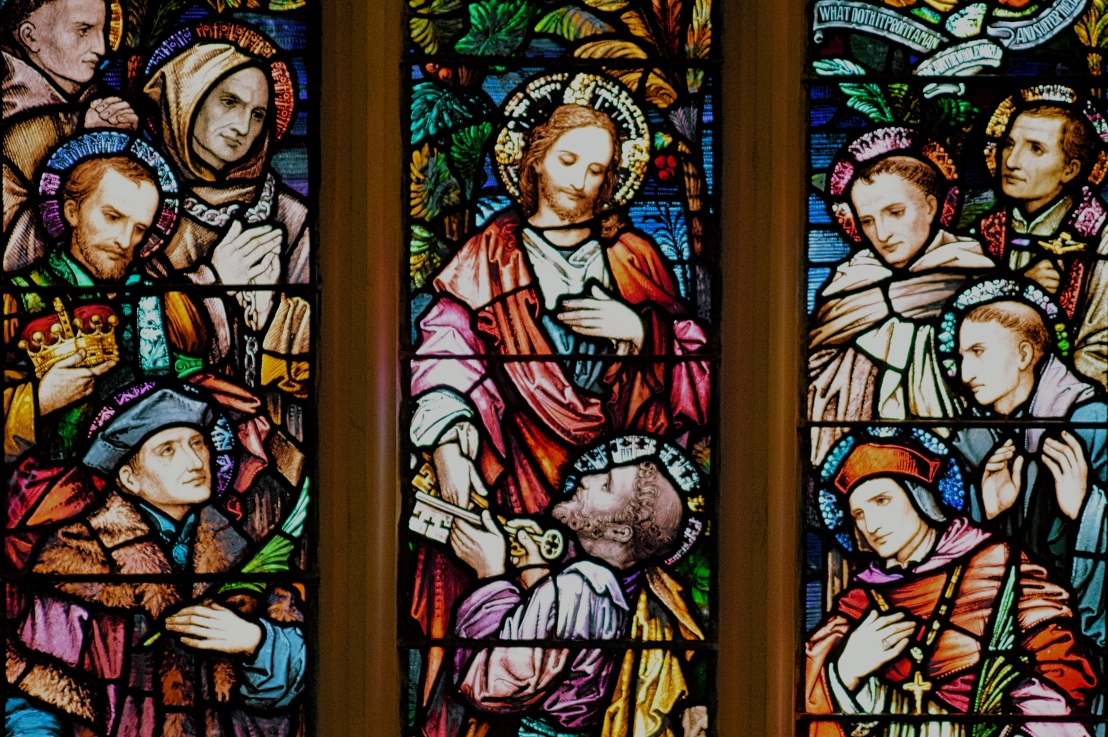
“And his master was angry, and delivered him to the torturers until he should pay all that was due to him. So My heavenly Father also will do to you if each of you, from his heart, does not forgive his brother his trespasses.”
Three interesting things come to the fore in this passage. What does it mean to be delivered to the torturers “until” the payment is paid off? What is the focal point of this “will do to you,” communal, individual, or both? And what does it mean to forgive “from the heart”?
But let’s begin by focusing on the bigger message: the Father gets “angry” when people aren’t forgiving each other. He wants His kingdom to be a place of forgiveness. Recall, Peter asked Jesus about use of the keys, how often he should use them, and Jesus gives this parable. To not use the keys abundantly, and often, is to incur the Lord’s wrath.
Now into the details.
Being delivered to the torturers “until” the debt is paid off suggests to some the doctrine of Purgatory. That’s a stretch. The servant will not pay off the 10,000 talent debt. Ever.
What’s more interesting is that the man was handed over to torturers. This tells us something about the character of the servant. Torturers in the ancient world were used to extract information out of criminals. This suggests the reason for the man’s squandering of a 10,000 talent loan was not due to negligence, but to criminality or fraud. In other words, he had the funds somewhere, fraudulently hidden. This suits his greedy character, which became manifest to the fellow servant who owed him.
If this interpretation is correct, it makes you wonder why the king would forgive such a greedy character. Did he not know his character? Well, maybe he did, and his point was, “I just gave you a gift of 10,000 talents to feed your greed. But think. If I create a kingdom where such gifts are possible, there’s no reason to be greedy. There’s plenty for everyone!” This theme, that the “treasures of heaven” destroy the limiting forces of mammon, such that there is eternal abundance for all, comes up quite a bit in the Gospel.
The servant, of course, didn’t learn that lesson, and insisted on remaining in mammon’s world of limitation and scarcity.
As far as interpretations go, this idea that the servant was fraudulent – a crook – adds some dimension. Here, it’s not just that he was unforgiving, but abusive with the gifts he did have. God’s grace is mine, but not thine. God’s forgiveness is for me, but not thee. I will sublimate and manipulate the doctrine of forgiveness – almost fraudulently – in a suit of armor protecting my own ego (to use a wonderful image recently conveyed to me), but deny you any benefits from that doctrine.
According to the parable, it may take torture to get the servant thinking rightly, to extract out of him the proper understanding of grace, both for himself and for others.
Who is the focal point of the phrase, “So My heavenly Father all will do to you”? Who is “you”? Peter asked the question, and a solid argument can be made he was asking on behalf of the twelve, or even the Church. The “you” is plural. So Jesus is issuing the judgment against the body of believers, the Church. What judgment? Being handed over to the torturers.
This fits with the tone of Jesus’ overall teaching. If someone causes a lost, little, repentant sheep to stumble in his faith because forgiveness is denied him, a millstone is put around his neck and he’s thrown into the sea; he’s cut off from the larger body; he’s tortured. In this context, the torturing may not be so much about extracting information – as interesting as that interpretation might be – but simply punitive. The idea is, if you get in the way of the Holy Spirit’s work, you’re done for, pure and simple.
But what if we apply a lens of interpretation that frequents the Gospels, and that’s the relationship between Jews and Gentiles? We noted that this might shed light on the Lazarus and Rich man account, and several others. Could we apply that lens here? Is Jesus preparing Peter for dealing with gentiles? The twelve apostles, the new tribes of Israel, were tasked with ministering forgiveness. They themselves – not only Peter but all of Israel – had been forgiven much, much idolatry, much faithlessness. Now, tasked with taking this forgiveness out among the nations, would they deny that forgiveness to the more gentile who comes to her seeking God’s grace?
The Jews, in fact, were forgiven much in Christ’s cross, but were “fraudulent” with this grace, setting up a structure of teaching and theology that “hid away” God’s grace in its many traditions and new laws, which denied its being administered to others. What if they needed to be tortured for a time, in order for them to learn the true nature of this grace? Jewish theology has an explanation for the suffering they’ve had over their history, that it is messianic. Is there something going on with this?
Also note that Peter himself had to relearn this parable when he first confronted the gentiles, and God gave him the “pigs in a blanket” vision. Read selections from this account in light of this week’s Gospel: Then Peter opened his mouth and said: “In truth I perceive that God shows no partiality. But in every nation whoever fears Him and works righteousness is accepted by Him. …And [Jesus] commanded us to preach to the people, and to testify that it is He who was ordained by God to be Judge of the living and the dead. To Him all the prophets witness that, through His name, whoever believes in Him will receive remission of sin.” While Peter was still speaking these words, the Holy Spirit fell upon all those who heard the word. And those of the circumcision who believed were astonished, as many as came with Peter, because the gift of the Holy Spirit had been poured out on the Gentiles also.”
Somehow, at first, Peter wanted to hide God’s grace in Jewish custom, preventing forgiveness from being administered to the Gentiles. He had to relearn the lesson of Matthew 18. The Jews’ greatest legacy is Jesus Christ, the incredible grace and forgiveness in Him, and yet they have no claim in Him. How angry is the Lord at this? What sorts of millstones and tortures are at work here?
Finally, we get to “forgiving from the heart.” This is probably the most bothersome language for most Christians, particularly from the Protestant tradition, who love focusing on the heart. “Have I really forgiven my abusive father?” Such questions haunt the poor Christian as he believes his eternal fate – bliss or torture – rests on the question of whether his heart was fully mustered in the forgiveness of someone who wronged them.
And we’re not longer talking about communal forgiveness here, as Jesus says, “So My heavenly Father also will do to you if each of you, from his heart, does not forgive his brother his trespasses.” He uses the phrase “each of you, from his heart.” That’s singular. The Lord definitely is teaching forgiveness, by each individual Christian, “from the heart.”
But keep in mind, the ancient view of the heart was not our modern understanding, which is feeling-oriented. Because of our view of the heart, we hear Jesus’ words about forgiving from the heart and think, “We have to really feel forgiveness for the one who wronged us.” And sometimes eradicating those feelings is downright impossible, so we fall into despair because of those torturers and millstones.
But let’s look at how one lexicon defines heart: “the causative source of a person’s psychological life in its various aspects, but with special emphasis upon thoughts—‘heart, inner self, mind.’”
In the ancient world, the heart was more like what I like to call “the heart of hearts.” It’s what we believe deep down. It’s the principles governing what we ultimately think. When I run into someone who struggles with forgiveness, I ask them, “Do you really, deep down in your heart, want this person to go to hell and be tortured forever and ever?” To that they will say, “Well, no.” Sure, they won’t have the right feelings, but forgiveness isn’t so much about feeling as it is about living by a principle. You don’t have to feel good about someone not to seek revenge, try to hurt them, or act out a principle of non-forgiveness.
And this leads us back to the communal nature of forgiveness, where I believe Jesus and Peter began. Forgiveness is a principle of the Christian Gospel that each Christian acts out in the Church and its fellowship. It is the heart, so to speak, of the Christian, the foundation of his Christian identity. Though he may not “feel” forgiveness for certain types of people in the church, he nevertheless supports the church’s ministry to be a place of forgiveness. It’s in his heart.







